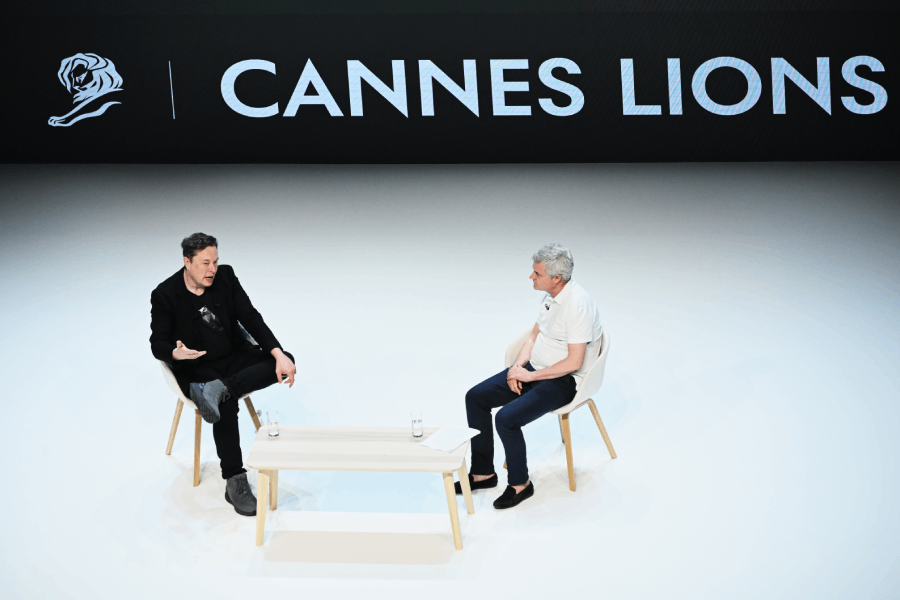It was packed to the rafters in the Lumière Theatre to see Elon Musk, chief technology of X (née Twitter) as well as the head honcho of SpaceX and Tesla in conversation with Mark Read, CEO of WPP.
Read said that “he didn’t agree” with Musk on everything but that it was important to give the South African businessman a platform to hear his thoughts.
That Musk should appear at the world’s largest advertising conference after telling the industry to “Go fuck yourself” at the New York Times’ DealBook Summit late last year is somewhat unusual. Musk has had a longstanding aversion to advertising and has steadfastly refused to advertise his Tesla cars to the public, instead relying on a fawning automotive press and its legions of die-hard fans with outsized online presences.
Read opened the questions to Musk with the “Go fuck yourself” remark. Musk said that it was “not to advertising as a whole” but it was important to maintain freedom of speech on X where advertisers were “insisting on censorship.”
Such free speech issues include Musk’s recent battle with Australia’s eSafety commissioner over his refusal to ban videos of the stabbing of Bishop Mar Mari Emmanuel in Sydney during a service. The eSafety commissioner Julie Inman Grant had sought a federal court injunction to entirely remove the tweets after X only made the tweets unavailable to Australian users and vowed to challenge the notice. It later dropped the case with X declaring that “free speech had won.”
Musk said that advertisers had the right to choose only to appear next to content that they deem safe. However, they did not have the right to insist on content being removed from the platform. Of course, whether pulling advertising dollars from a platform because you disagree with its actions amounts to censorship is an open debate.
On the concept of brand safety, Musk added “Every third-party verification tool has given us an A+.”
The conversation moved onto the nature of advertising itself. Musk declared that if you are shown an advert for a product you want “that is content” and if you’re shown an ad for a product that you will never be interested in buying is “bad.”
That, of course, is a pretty base understanding of advertising as a whole.
Read asked Musk what changes he would be making to X to improve the advertising experience. Musk said that “there was essentially no targeting” on Twitter under its previous ownership and that now X was using AI to target a “vector space” for users. He also added that “content” and “ads” would be treated the same under the new model. Quite what that means in practice remains to be seen.
However, Musk maintained that X was the premier destination for marketers and advertisers to reach senior decision makers, influential people around the world “who run countries” and companies.
“They’re not watching TV, they’re not making TikToks,” said Musk, to a ripple of laughter.
However, when it came to assessing the viability of his companies’ products, Musk said that he “didn’t ask people” and that surveys did not provide real insights into customers.
Quoting Henry Ford, he said, “If you asked people what they wanted, they’d have said faster horses.”
Instead, Musk said that he tries to “simulate” the end-user experience and this would show the viability of products.
Moving to AI, Musk said that he found Jeff Hinton’s assessment that there was a 10-20 per cent chance of “something terrible” happening, Read asked what that meant and Musk told him to “look on the bright side.”
Musk said that “the most likely outcome” of AI would be to make “work optional” for everyone after it creates an abundance of goods and services. However, he added that this would create an “existential crisis” for humanity, with there being no point in doing anything because AI would be able to do everything better than people. Musk said that he would most likely keep working.
Read pressed Musk on how AI will manifest itself in the creative industry in the future. Musk said that he believes AI will become truly creative and original – though he didn’t say exactly why this will happen.
“You’re supposed to inspire people, not tell them they won’t have a job!” said Read, to a round of laughter from the audience.
Musk said that AI was going to change things “very fast” and we would see “radical changes” this year or next year as a result of OpenAI’s activities (the company that Musk co-founded and is behind ChatGPT) and very radical changes within the next “five years.”
Musk doubled down and said that only the companies that effectively implement AI would survive.
Moving to the business of news, Musk said that while there was “still a role” for “traditional journalists” but technology would democratise the process, allowing millions of people to crowdsource news. This, Musk believed, would make the role of traditional news “smaller and smaller.”
He also said that traditional journalists publish articles that “often are” wrong. He also said that most journalists do not report on the scene of events and simply “read the internet” and re-print it in newspapers.
Closing the session, Read and Musk asked for audience questions and then refused to take a question from a journalist.








